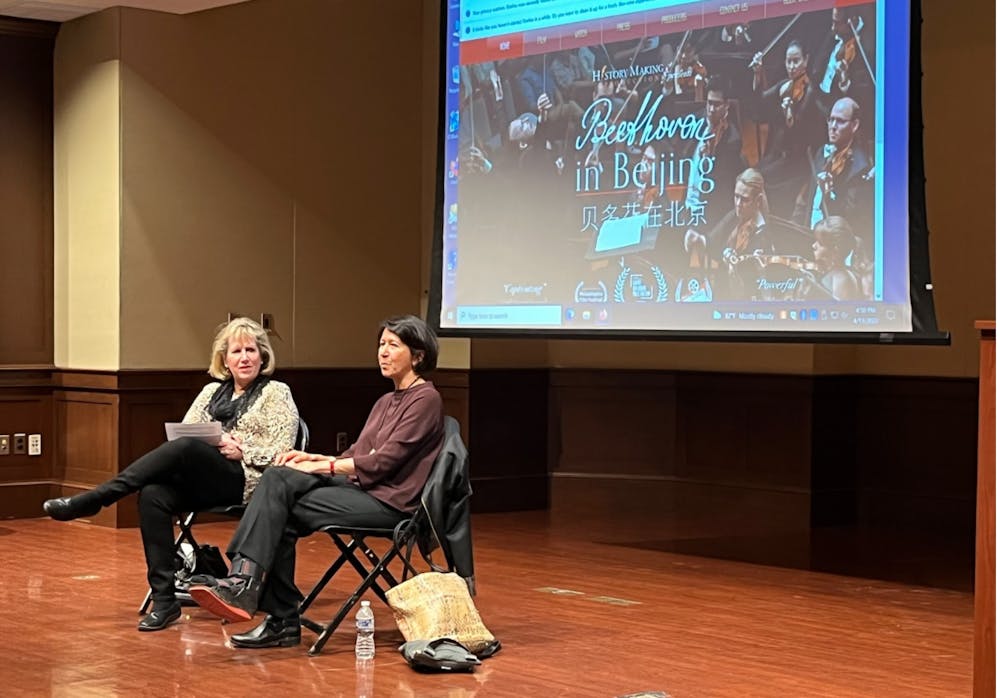By Chelsie Derman
Arts & Entertainment Editor
Jennifer Lin, co-director of “Beethoven in Beijing,” came to the College on April 13 in the Library Auditorium to talk about the documentary she directed, produced and wrote. Before Lin co-directed the well-researched “Beethoven in Beijing,” she worked as a financial correspondent on Wall Street, a foreign correspondent in China for The Philadelphia Inquirer and a national correspondent in Washington D.C.
Despite Lin’s years of being a journalist, the event focused on Lin’s documentary, which was released in 2020. Lin reunited with former Philadelphia Inquirer colleague, Emilie Lounsberry — who now works as a journalism and professional writing professor at the College — for a moderated Q&A. The event also included an audience Q&A at the end.
“I really liked hearing about the creative process and what goes into filming a documentary because, I know that obviously it’s a movie, so you’re thinking about whose quotes to add in, what visuals you want to show,” said Kelly Stephens, a junior journalism and professional writing major.
While many of the students in the audience were journalism and professional writing students who had already watched Lin’s documentary before coming to the event, Lin still described her documentary and why she chose to make a movie about that specific topic.
“Beethoven in Beijing” begins with describing the friction between the U.S. and China in the 1970s. According to Lin, Americans were known to the Chinese as the “American wolf.” There was also a power struggle going on between China, the Soviet Union, and the U.S. At the time, President Nixon reached out to counterparts in China in 1972 in an attempt to better the relationship between China and the United States. The U.S. ended up sending ping-pong players, swimmers and college basketball teams to China.
However, what really stirred excitement was when Nixon sent the Philadelphia Orchestra to China.
“It had to be the Orchestra because it was Nixon’s favorite,” Lin said.
Lin said that only about one hundred Americans lived in China in 1973. However, with the orchestra making its way into China, about 130 Philadelphians entered the country. The arrival of U.S. musicians made the front page of China’s newspapers.
“It left such a deep impression (on participants),” Lin said.
Lin first pitched “Beethoven in Beijing” in 2015 to the orchestra and the documentary was approved a year later. The film was completed in 2020, right before the world got thrown into quarantine. The film premiere, as well as the scheduled film festivals, all went virtual.
Lin said there were a number of challenges when creating the documentary. After all, Lin is a reporter and an author, but this was the first documentary she tackled.
“One of the challenges was telling the story and not being all over the place,” Lin said.
She said filming in China had its difficulties — that it was hard to just go out in the streets with cameras and record without being stopped.
“You have to be able to work around the system while still working in the system,” she said.
Melissa Smith, a senior music and communications double major, said she was struck when Lin described the film restrictions in China.
“I would have expected them to have difficulties with interviewing people on the street, but I was surprised she said they were even stopped when they were just getting scenic shots,” Smith said.
Smith’s communications professor, Dr. Yifeng Hu, had recommended her to come to the event and watch the documentary.
“It was moving to watch the scene about the two people hiding to listen to Western classical music,” Smith said. “I can’t imagine listening (to) Beethoven’s music with a fear of being caught by law enforcement. It made me realize how much I’ve taken for granted the freedom I have to listen to any kind of music I would like.”
To prepare for the documentary, Lin searched through the archives. She also interviewed many musicians who had been in the orchestra in 1972.
“It was like an audition,” Lin said.
Another challenge Lin had was trying to make the documentary “come alive.”
“We didn’t want the documentary to be talking heads,” Lin said.
Lin also addressed the difficulty of obtaining Nixon’s phone call, which was featured in one part of the documentary. She found the clip in a Nixon library archive under an audio file called “Ormandy,” which was simply Nixon’s voice when picking up the phone.
“I really liked how she had put in recordings from the Nixon library and incorporated all of these different things and all of these different voices into the story because it is a lot to break down,” Stephens said.
“It was just gold someone placed in my hands,” Lin said, of the audio file.
Lin is now working on a new documentary called “Yellowface,” which according to Lin is all about the “world of classical ballet.”







